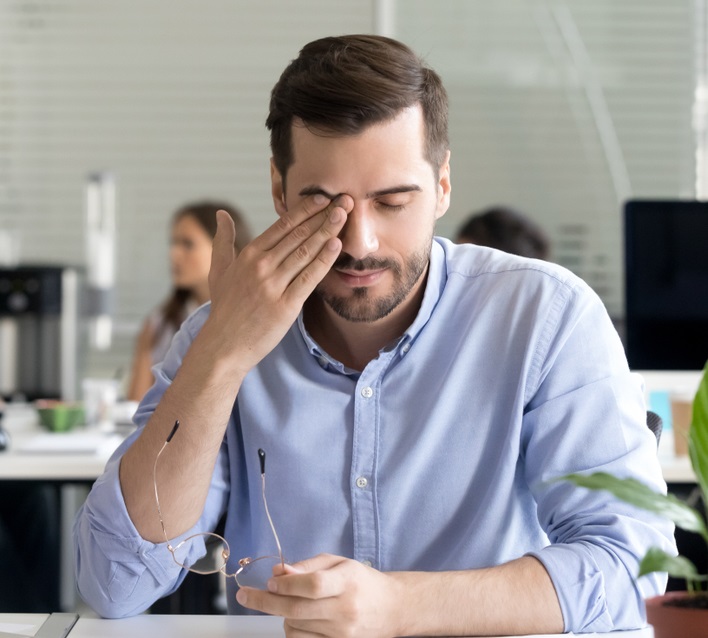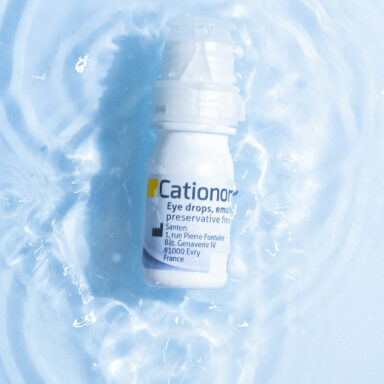Dry eye can be caused by many things – In simple cases, it could be as straightforward as an air conditioning vent that needs repositioning, but for other people it could be a combination of age, allergies and medication that can be harder to pinpoint.1,2,3
But don’t be disheartened! Whatever the cause, dry eye is treatable and there are many things you can do to avoid triggers which can make symptoms worse.1 Read on for a deep dive into what causes dry eye.
Did you know?
Anyone at any age can develop dry eye and up to 1 in 3 people in the UK live with it.4,5
The main causes of dry eye
Internal factors – things about you and your body (some of these often can’t be changed):
- Age3
- Hormone changes3
- Pre-existing health conditions3
- Genetics6
External factors – things outside of you that you’re exposed to (these can often be avoided or changed). These can be what causes dry eye all of a sudden:
- Your environment5
- Medication you’re taking5
- Exposure to irritants and allergens5
- Certain activities5
Age-related causes of dry eyes
Once you get over the age of 50, you’re more likely to develop dry eye.3 For example, the incidence in women who have gone through the menopause increases from around 1 in 20 in those at younger than 50 years, to up to 3 in 4 from age 75 years.7 This is why:
- Tears – You produce less tears and they spread less well across the eye8
- Glands – The glands that help produce the moisturising oil in your tears become less effective8
- Eyelids – These can loosen as the tendons stretch with age, so you blink less well8
- Other conditions – you become more likely to develop other conditions, such as glaucoma, which can lead to dry eye8
- Medication – because of the above, you’re more likely to take medication and a side effect of these can sometimes be dry eye8
- Hormone changes – more on this, below!3
In studies of older people with dry eye, the condition was found to significantly impact daily tasks such as reading, using a computer and driving – so it’s important to get it treated!8
Can menopause cause dry eyes?
According to one survey, two out of every three women who were going through menopause or were in the lead up to it, had dry eyes.9 It’s because of decreasing sex hormones: These affect the glands in the eyes which make oils for our tears.10,11
It’s not just menopause. Other hormone changes can affect our eyes too:12
- Certain days in the menstrual cycle
- Pregnancy
- Taking the contraceptive pill
Unlike menopause, dry eye caused by the above is often (thankfully!) temporary. Once the hormones settle down, for example when the baby is born, the eyes feel better again.
Medical conditions that can cause dry eyes
If your eyes are dry, it might just be the result of a long day or natural aging, but persistent symptoms can sometimes point to underlying health conditions such as:
- Sjögren’s Syndrome13
- Rheumatoid arthritis13
- Sarcoidosis13
- Thyroid Conditions13
- Vitamin A deficiency13
- Lupus 13
- Blepharitis14
- Glaucoma15
- Parkinsons16
- Diabetes (particularly type 2)17
That’s why it’s important to get a proper diagnosis by a health care professional such as an eye doctor.
Did you know?
Some medications for allergies, blood pressure, nasal congestion, and antidepressants can lead to dry eyes. Don’t stop taking them though, speak to your doctor first about alternatives.18
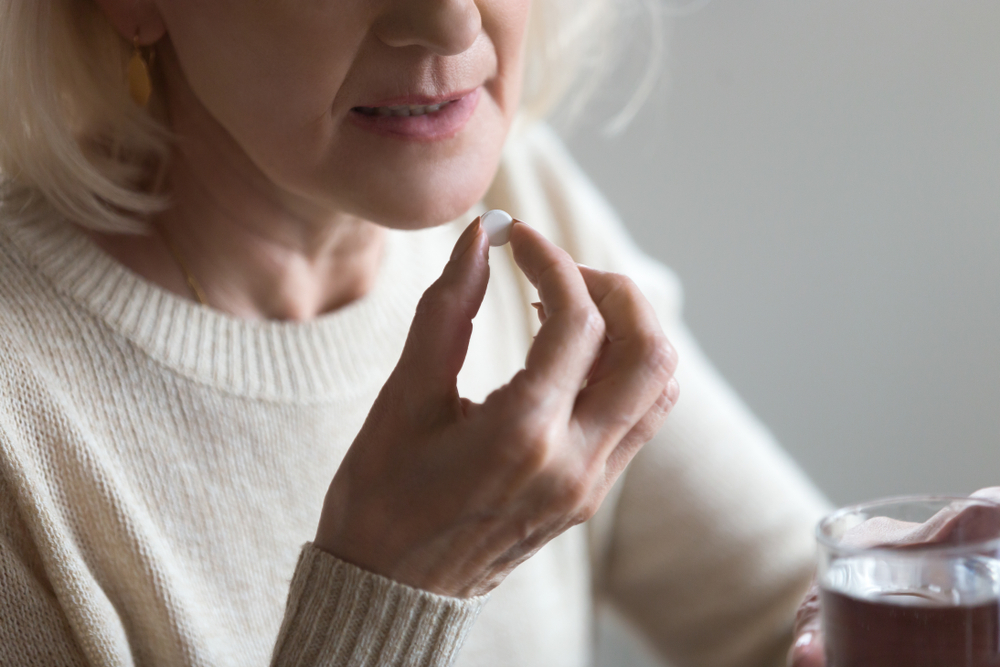
Did you know?
You can get dry eyes temporarily after eye surgery. Studies show that 95% of people who underwent LASIK surgery and more than 87% of people who underwent cataract surgery had symptoms. The good news is it normally improves after a few months and symptoms are usually gone in 6 – 12 months.19
Environmental factors that contribute to dry eyes
Whether it’s the pollen-laden breeze of spring or those hours spent staring at your phone, several environmental factors could be silently sapping the moisture from your eyes:
- Allergies: Allergens like pollen, dust, and pet dander can also lead to itchy, red, and, you guessed it, dry eyes.2
- Screen time: Spending hours glued to our screens can cause us to blink less, leading to dry eyes.5
- Air conditioning and heating: These modern conveniences can dry out the air in our homes and offices, leaving our eyes feeling parched. Consider using a humidifier.20
- Wind and dry climates: Some weather can evaporate tears quickly, leading to dry eyes.5
- Smoke: Whether it’s from cigarettes or a roaring campfire, smoke can irritate and dry out your eyes.5
- Air travel: The air in airplanes is notoriously dry, which can leave your eyes feeling gritty and uncomfortable.21
Does dehydration cause dry eyes?
When we’re dehydrated, our body can’t produce enough tears, leading to dry eyes.22 So, go ahead, take a water break – your eyes will thank you!
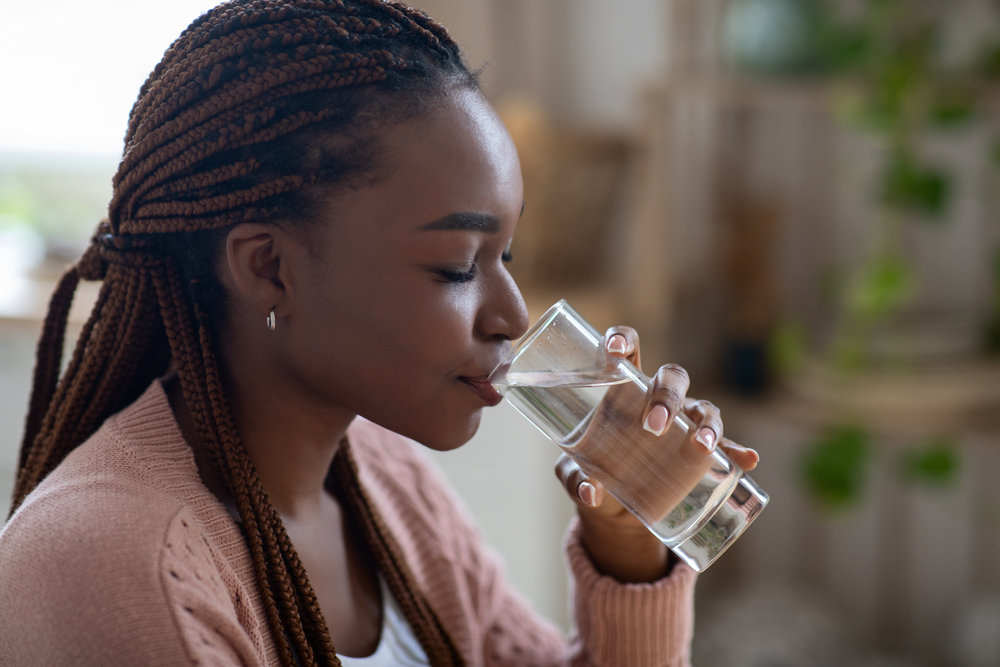
Did you know?
Tears are made up of water, oil, and mucus.23 Without enough water in our body, the tear production can’t keep up, leaving our eyes high and dry.22
Managing dry eyes
Just like you wouldn’t skip lip balm on a cold day, eye drops can be a game changer in keeping your eyes feeling comfortable and well-lubricated.24
Artificial tears like Cationorm® help restore moisture and prevent fluid loss, protect the surface of the eye and relieve discomfort and irritation.25,26,27,28
Cationorm works by mimicking the body’s natural tears to provide long-lasting relief from dry eye.29 It’s clinically proven and is available online or over-the-counter at the pharmacy.27,30 Always read the label.
Top tip
If your eyes feel dry in the morning, keep some artificial tears on your bedside and make it part of your morning routine.31
Remember, managing dry eyes is all about consistency. So, keep up the good work, and your eyes will thank you!
Complications of dry eyes
Dry eyes might seem like a minor nuisance, but if left untreated, they can lead to serious complications for some people:
- Eye infections: Our tears are the body’s natural way of keeping our eyes clean. When tear production drops, our eyes are more prone to infections.32
- Damage to the surface of the eye: Severe dry eye can lead to inflammation and damage to the surface of the eye, including the cornea, which can affect your vision.32
- Decreased quality of life: It’s not just about physical health – dry eyes can also affect your daily activities, making it difficult to read, drive, work on a computer, or do other tasks that require visual focus.32
- Eye discomfort: One of the most common complications of dry eyes is discomfort or even pain, which can significantly impact your wellbeing.32
When to see a doctor for dry eyes?
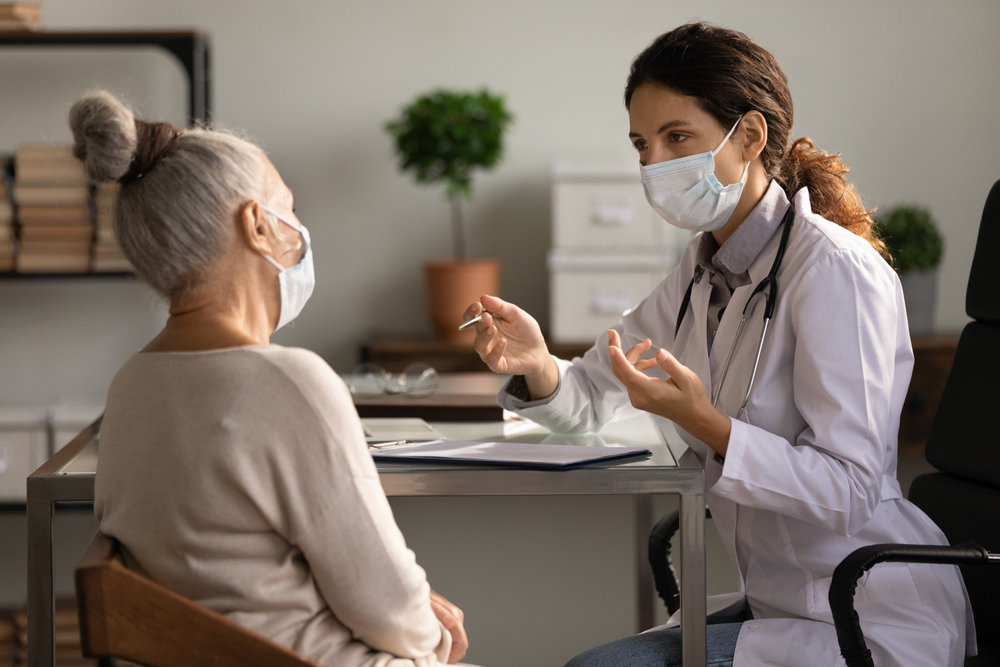
While everyone experiences dry eyes occasionally, there are certain signs that it might be time to call in the professionals:33
- Persistent symptoms (lasting more than a couple of weeks despite home treatments like eye drops)
- Painful and red eye/s
- Change in the shape of your eyelids
- Vision changes (e.g., loss of vison, wavey lines)
Remember, while dry eyes might seem like a small problem, our eyesight is precious so it’s always better to be safe than sorry. If in doubt, see a healthcare professional, such as your doctor, pharmacist or ophthalmologist.


